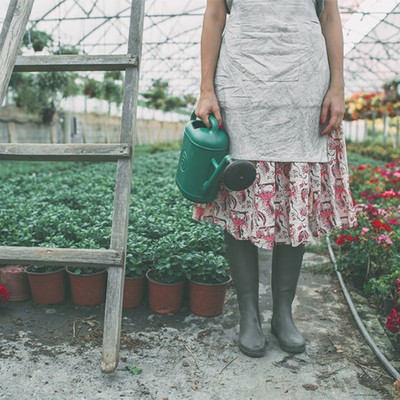
Considering Moving To The Country? Read This First
Money worries, lack of space, pollution, crime, huge crowds… Packing up sticks from the drudgery of urban living and heading for the hills has been the traditional migration path for 30- and 40-somethings for decades – especially those with small children . But not only is it more popular than ever, it’s now a major trend for younger generations too. Last year, research by estate agents Hamptons International showed that almost 94,500 people made the move out of cities to the countryside over the prior 12 months – 16% more than in 2016 and the highest number since 2007. And according to additional figures from rural property experts Humberts, up to 30% of leavers are in the 20-29 age group.
However, it’s not necessarily an easy move. Hamptons research analyst, David Fell, revealed not all urbanites can’t get to grips with rural life: “If you cut out a move to suburbia and move straight to the sticks, you are nearly twice as likely to move back to the city again.” He says that five to ten percent of former Londoners end up moving back to town – and for those, the old adage ‘When a man is tired of London, he is tired of life’ may actually ring true.
Because as Telegraph writer Hettie Harvey explained – sharing the story of her own move from London to Shropshire – reality doesn’t always live up to expectations. She details how she dreamed of swapping her Finsbury Park home for a “huge, ramshackle (yet cosy) farmhouse, with flagstones on the kitchen floor, a dog curled up by the Aga, in a remote location (but close to a shop and a lovely pub) with beautiful views”, and envisioned herself becoming “super-fit and sylph-like”, thanks to all the exercise and fresh air she’d be getting.
What Harvey actually ended up with was a “comfortable and practical” semi-detached house: “The kitchen floor is lino; the Aga an electric cooker ordered from Currys on a Black Friday panic spree, days before we moved; the view a patch of grass that stubbornly remains more field than garden. There’s no dog as of yet (too risky on the A-road) but we do have plenty of mice,” she wrote, adding that her fitness goals have also fallen by the wayside. “I’ve less active in my life and am expanding steadily, day by day”.
But despite not realising the picture-perfect existence she’d originally envisioned, the mother-of-two said she “couldn’t have dreamt up a more idyllic childhood setting” for her children, revealing her family had achieved their most important goal of all – spending more time together.
It’s a sentiment financial journalist Faith Archer, who started the blog Much More With Less to document her new downsized country life, shares. Archer and her family moved from the now-hipster-filled Stoke Newington to Hadleigh, a market town in Suffolk, four years ago – and says it’s helped both her family and her bank account thrive. While she admits country life isn’t as low-cost as some may assume (“The upkeep – oh goodness,” she says of her huge Georgian house), it’s inspired her to be even more creative when it comes to making the most of her money.
And despite having to commute to London fairly often for meetings, Archer says she’ll never look back. “It’s always a relief to swap the grey city streets for green fields on my way home,” she writes.
Along with helping other families be more frugal, Archer also shares her advice and tips for making the switch. So if you’re debating it, you’ll want to read her very wise words of wisdom below:
10 things to think about before moving to the country…
1. The Pros & Cons Of More Space
Buying a bigger home can be a massive advantage of moving to the country. However, you’ll also need to maintain, furnish and heat any extra rooms, which could add big bucks to your running costs. At the other extreme, that cosy cottage might end up a squash and a squeeze if you’re trying to cram in too much stuff. The characterful low beams are less attractive when you’ve bumped your head on them for the nth time.
2. The Effort Big Gardens Require
Similarly, if you struggle to maintain a couple of houseplants in the centre of a city, it’s worth avoiding acres of garden, unless you have full-on Monty Don tendencies or the budget to pay someone else. Perhaps try an allotment before launching into full on self-sufficiency…
3. Which Location Suits Your Lifestyle
Sure, you want a more peaceful life, but do you really want to be stuck in the middle of a field? There’s a whole spectrum of options from isolated to small village to market town to the outskirts of a bigger place.
4. The Transport Links
Can you walk anywhere from your new des res, or are you going to be driving all the time? Living in the country means you may have to budget for at least one, and more likely two cars, if you’re moving as a couple. If you have children, don’t just consider the school run, but also chauffeuring kids for any after-school activities, parties and meeting up with friends. What can kids do locally, and is there any public transport when they might want to go further afield?
5. Your Commute
There’s always a balance between property prices and proximity to commuter routes, whether major road or rail links. Paying less for your home could increase your commute – what’s that extra 30/60/90 minutes a day in travel time worth to you? Do add up how much time and money (whether in fuel or train tickets and station parking) you’ll be spending every week on commuting. Allow for hefty price rises too. Season ticket costs can shoot up a lot faster than average salaries.
6. The Effects On Your Work
Maybe you don’t want to commute. If you can work from home, check mobile and broadband coverage before you end up living in a broadband blackhole. Otherwise you need to be realistic about local employment prospects, or resign yourself to life-long commuting. For working parents in particular, flexible and part-time jobs may be trickier to find than in a big city.
7. The Schools Nearby
Even if offspring are but a glint in your eye, do consider schools – including secondary schools – before making the leap, or you could find yourself uprooting all over again. As a parent, it’s easy to get obsessed with Ofsted reports, but think about what school could be right for your own kids. A tiny village school might help a shy child blossom, but a larger school brings more chance of finding friends with shared interests.
8. Your Support System
For some, moving to the country means moving closer to family and friends and an extended support network. Otherwise, if you’re moving somewhere completely new, consider how you’ll cope far from people who have previously helped with emergency babysitting, odd jobs or company over a cup of tea. It can take a while to make new friends in a small community, and if you head off to the Hebrides, your old friends may not be able to visit often either.
9. The Local Community
If you’re considering a village or small town, is there anything going on? A place that is just a dormitory for a larger town, or full of rarely-used second homes, could be lonely if you’re living there all the time. Maybe you don’t fancy signing up for the local running club or am dram panto. However, evidence of sports and social clubs may make it easier to meet people.
10. Whether You’re 100% Sure
More than anything else, it’s worth thinking through a big move to the country because it may be difficult to move back. Why? Because house prices are likely to shoot up faster in cities – especially in London – than in the depths of the countryside. If you find you prefer decent take-out coffee to cowpats, you may also find that you cannot afford to move back.
DISCLAIMER: We endeavour to always credit the correct original source of every image we use. If you think a credit may be incorrect, please contact us at info@sheerluxe.com.





























